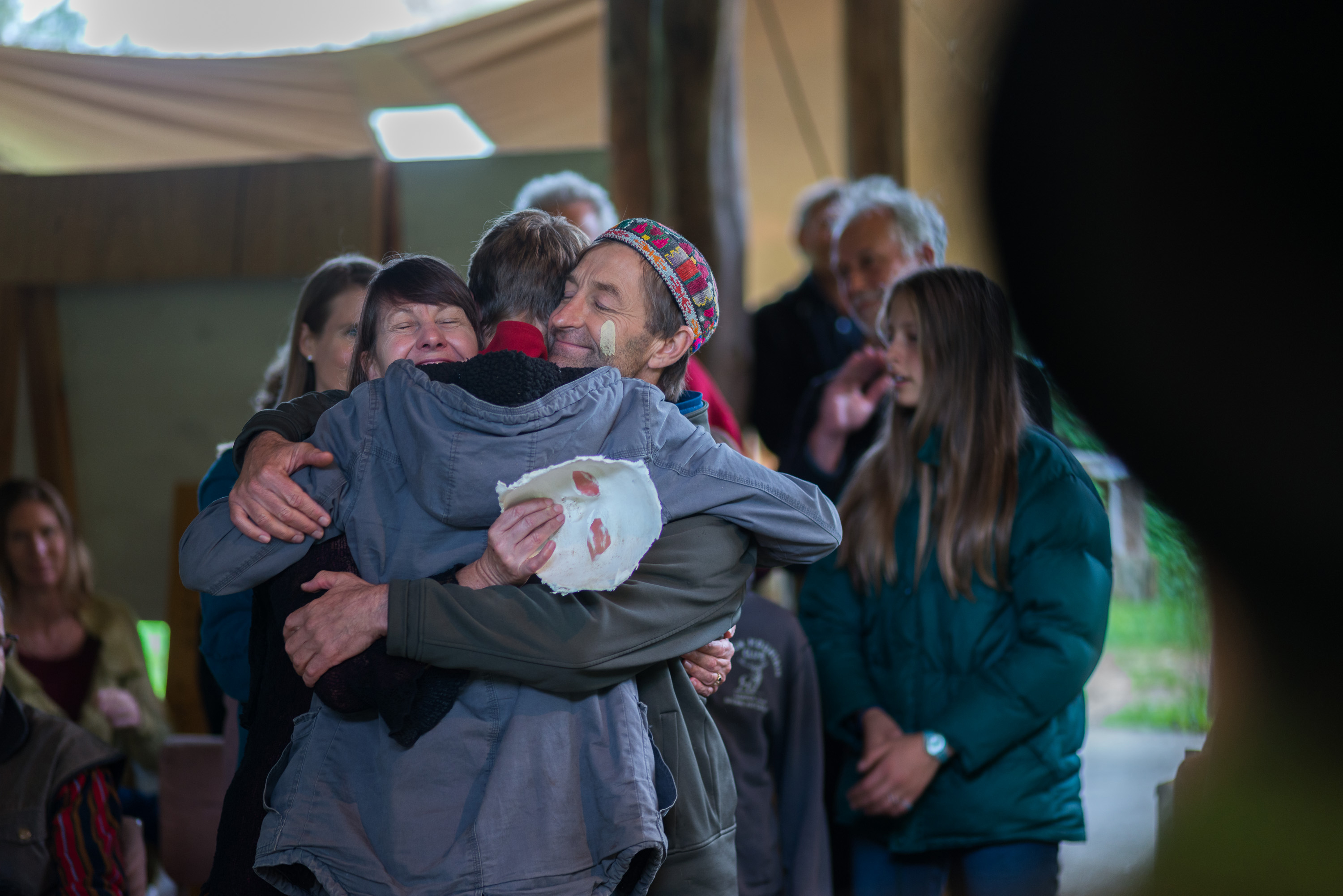The Rite Path


Family welcoming back their son during the community return ceremony. Photo: Supplied
Imagine sitting amongst a group of people sharing your feelings and personal experiences, and being completely accepted for who you are. It doesn’t seem like too much to hope for, yet for many of us, such a display of public vulnerability would be a fleeting life moment, if ever a moment at all. For teens living in a world where @social_media emanates a cult leader charisma fully embraced by its followers, and truth scrolls down to legit-looking fakery, how do our teens learn to be themselves, trust their instincts, and recognise who and what is real? Britt Coker passes a talking stick to those with answers.
For thousands of years, indigenous cultures around the world have marked the shift into adulthood with a rite of passage for its young people. The closest we get to that in New Zealand is electoral voting, getting your driver’s license, and remembering to put the recycling out your first year of flatting (though of these, only recycling is mandatory). However, if you would like to acknowledge this important life transition, there is another way.
The Rites of Passage Foundation (ROPF) began in 2002. Based on the grounds of the Tui Community in Golden Bay, for two decades it has provided opportunities for teenagers to embark on a multi-day event denoted by three distinct stages reminiscent of an indigenous rite of passage: separation, transition, and integration back into the community.
Initially, the five-day experience was for young men and their fathers, supported by other men in the community. The Tracks programme was followed two years later by Tides, for young women and their mothers. One of the foundation’s trustees and Tides programme director, Rita Scholten, describes the experience that facilitators observe on a Tracks rite of passage:

“The first day they come in, I would describe a boy, very self-conscious, looking at other people, comparing themselves, stepping into the unknown. And in the five-day programme, they get to know themselves. It gives them mental tools, emotional tools and physical tools to get through challenges. And then you could say they also have an awareness of the wider existence, because we bring them into a liminal space (transitional state). So, what we see at the end is somebody that is standing a bit taller. They discover parts about themselves through having multi-generational men around them. That gives them strength. They are more in contact with their own feelings. They have stood in front of the group to share about themselves, they have discovered that actually, I am the one that is in control of how I respond, how I speak, how I relate to others. And I would say that's the crux of the difference between a boy and an adult. A boy sees the world still from ‘Oh, everybody outside is doing things to me’, but a mature adult will look at it a different way. He will say, ‘I am part of everyone and of the environment, and I have a chance to make a choice in how I respond.’ They speak from the ‘I’. ‘I actually feel triggered around this,’ not, ‘You did this to me. You make me feel…’. That's probably the biggest difference that we see overall. It's taking ownership.”
Eighteen-year-old Hari D’hont first did Tracks three years ago. His two older brothers had been through the programme with their dad, so Hari knew he would also have the opportunity and was looking forward to it. His anticipatory enthusiasm seemed well-placed, as he has since returned a number of times as a ‘tracker’, supporting other young men who are doing Tracks for the first time. I ask him how it changes someone.

“The impact is so subtle yet, so profound. So, it's not one thing; it's thousands of little things that accumulate. How I would describe it is they're authentically being seen for themselves. There are no masks. There's no trying to be macho. There's no trying to be something that you're not. And I think that's really profound, to be seen authentically and be with men of all ages, being able to feel safe that you can express what you are, and be supported and uplifted for that. There's absolutely no judgment. And I found, for myself, that actually, who I am is really cool, and I should go for it. I should continue being myself. Like, that's an awesome thing to do.”
Hari says the rite of passage improved his relationship with his dad, giving them a shared experience to connect over. “Before Tracks, I never really hugged my dad. For whatever reason there was a barrier I put between myself and my father, and that barrier is still there to some extent, but it's definitely been broken down. A hug is totally, totally normal. That's what I found that was profound, was it gave us a language to connect.”
Bringing all that openness into the real world can be tricky for a person at any age. He says, “I think there's a normal, and if you fit into that normal, it feels safe. It's a defense mechanism to be together.” But Hari has managed to stay his true self and inadvertently motivated his non-initiated friends in the process. He says they noticed a positive change in those in his friend group who had done Tracks, and that made them want to do it too. So they did. “I think it's a really beautiful thing. It's been incredible to see their change ... they're holding themselves so strongly and just sharing their kindness.”
The ROPF’s most recent social impact report (2018-2023) said 93% of youth participants believed the programme had made them feel better connected to themselves, and 97% of them, better connected to others. It also reported that during the five-year report period, 111,720 hours of participants’ time had been diverted away from looking at their devices.
The initial vision of the foundation has since expanded into other programmes as the trustees recognised that it is not just teenagers who are looking to understand themselves better. They now cater for 9-11 year olds, 18-35 year olds, and people wanting to do seven-day wilderness solos. Men and women can mark current life stages on their respective programmes, plus there is also a gender-inclusive, intergenerational gathering, and one for women, wild and wise (50 plus). There are clearly plenty of people out there looking to understand themselves, to feel less alone in a crowd.
Ruby Botica first did the Tides programme with her mum when she was 14. She returned as a buddy to support other young initiates and now, aged 19, helps facilitate and lead sessions. Ruby loves a couple of the aspects that others may, at first, like the least.

“I think one of my favourite parts about Tides is the device-free part. No one has a phone for the seven days that crew are there and four days that other people are there as well. There are no devices and there's also no clocks. So time just becomes something very different, and because we're outside as well, time kind of just reverts back to being what the sun's doing and what the tide is doing, rather than what your phone or your watch are doing. I really, really enjoy that. And I don't have any other spaces in my life where I can completely get away from that connectedness to the outside world. I realised, after doing Tides and experiencing that, what an amazing detox it was for my brain to have a break from that.”
Like Hari, Ruby has found her involvement with the foundation has significantly shaped and inspired her. She’s discovered in herself natural leadership skills and an ability to hold space for others. It has also improved her relationship with her mother.
“That first time, what it really helped for us was to develop the relationship past mother and child, to mother and young adult. There's still that mother-daughter thing, but there's this really awesome friendship, and I've seen that develop in lots of mother-daughter pairs over the time. Parents come to Tides expecting that it's mostly a programme for the young adult coming through, not really for the mother, but what they find out is it's actually so much for the mother as well, to have her own experience. I think that a lot of that has to do with the young person being able to see their mother as a whole person, and also see them speak really authentically about their life and who they are, which can shift that perspective to, like, Whoa! This is a whole person.”
Ruby has a message for the adults too. “I feel I'm seen more as an equal, and I feel proud to be a good example of someone in my generation. Because I think that I've come across some scrutiny of my generation. I think that sometimes older people can forget that we're actually really wonderful and have a lot to offer.”
The first stage is separation, the second is transition, and the third, a celebrated return to your community. To emulate this, the participants’ families are encouraged to arrive on the last day to welcome back a new version of someone they love. Rita has witnessed many returns over the years but still finds them a moving experience.
“You can imagine, after five days for the women, they are seeing a very soft husband who's gone through a really poignant programme. And then they see their son as a young man who has an aspect risen in him that they have not seen before, or they knew about. And the mum has got a chance to say words to her son, witnessed by the whole community, and that is so powerful as a family. If you had struggles, and you stand there and you acknowledge your son for who he is, there is a ripple effect, and everybody's witnessing, so everybody will look at that boy again, knowing, ‘Wow, I have seen you in a different way.’ Grandparents come, friends come, sometimes we have a group of 15 people standing there to welcome in a new young adult.”
To experience your own rite of passage, go to tracks.net.nz
